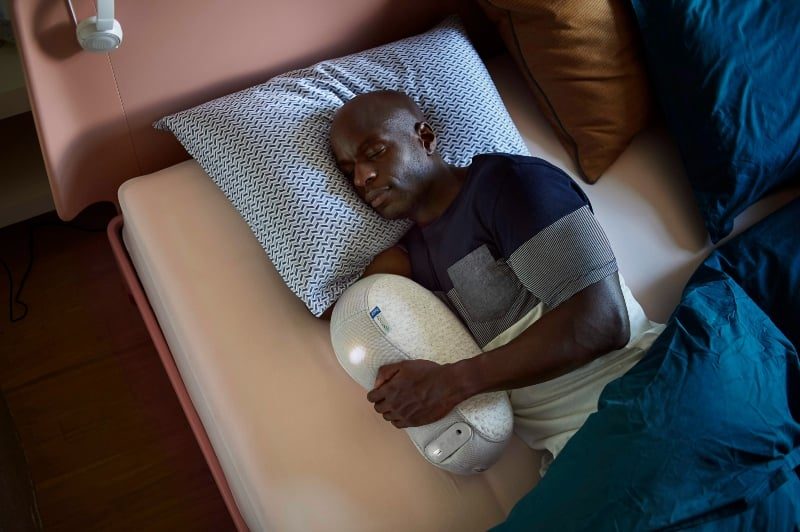
BY YALE
Sleeping too much or too little is associated with changes in the brain that are known to precede and increase the risk of stroke and dementia later in life, a new study suggests.
In one of the largest neuroimaging studies of its kind, researchers at Yale School of Medicine (YSM) examined the brain images of nearly 40,000 asymptomatic middle-aged adults to understand how their sleep habits may affect their brain health.
The researchers found that suboptimal sleep duration is significantly correlated with silent brain injuries that clinicians know to foreshadow stroke and dementia years before their onset. Following the American Heart Association’s Life’s Essential 8 guidelines, the researchers defined suboptimal sleep duration as less than seven hours per night or nine or more hours.
Their findings appear in the Journal of the American Heart Association.
“Conditions like stroke or dementia are the end-stage result of a long process that ends tragically,” says Santiago Clocchiatti-Tuozzo, postdoctoral fellow in the Falcone lab at Yale School of Medicine and first author of the study. “We want to learn how to prevent these processes before they happen.”
A poor night’s sleep can increase one’s risk for a wide range of chronic health issues, including heart disease, obesity, and depression, a growing body of research shows. To learn more about the effect of sleep duration on the brain, researchers can evaluate neuroimaging markers of brain health, including white matter hyperintensities and fractional anisotropy. White matter hyperintensities are lesions in the brain that indicate brain aging and small vessel disease (disorder of cerebral microvessels). Fractional anisotropy quantifies the uniformity of water diffusion across nerve cell axons, reflecting the structural health of the brain’s white matter. Greater presence and volume of white matter hyperintensities and decreased fractional anisotropy are associated with increased risk of stroke and dementia.
In this new study, the researchers obtained data from the UK Biobank, an extensive biomedical database with over a half a million participants between the ages of 40 and 69. Among the information it has collected are interviews in which participants reported their average sleep duration, including daytime napping. Nine years after these interviews, the UK Biobank randomly selected approximately 40,000 participants to undergo a brain MRI neuroimaging study.
The team evaluated how too little sleep (less than seven hours), optimal sleep (seven to less than nine hours), and too much sleep (nine or more hours) affected the presence and volume of white matter hyperintensities and fractional anisotropy.
After their analyses, the team found that suboptimal sleep was significantly correlated with poor brain health. This relationship persisted even after adjusting for other risk factors known to affect the brain including hypertension, diabetes, and smoking.
“These findings add to the mounting evidence that sleep is a prime pillar of brain health,” says Clocchiatti-Tuozzo. “It also provides evidence toward helping us understand how sleep and sleep duration can be a modifiable risk factor for brain health later in life.”
The study highlights middle age as an important time to adjust our sleep habits in ways that may help protect our brain health. Clocchiatti-Tuozzo hopes that his work will inspire future clinical trials to determine whether making such sleep modifications can improve brain health during older age. His team is also interested in studying how genetics may influence sleep.
“Sleep is starting to become a trending topic,” he says. “We hope this study and others can offer insight into how we can modify sleep in patients to improve brain health in years to come.”
Source: Yale University
Original Study DOI: 10.1161/JAHA.123.031514
—
This post was previously published on futurity.org under a Creative Commons License.
***
From The Good Men Project on Medium
 What Does Being in Love and Loving Someone Really Mean?
What Does Being in Love and Loving Someone Really Mean?  My 9-Year-Old Accidentally Explained Why His Mom Divorced Me
My 9-Year-Old Accidentally Explained Why His Mom Divorced Me  The One Thing Men Want More Than Sex
The One Thing Men Want More Than Sex  The Internal Struggle Men Battle in Silence
The Internal Struggle Men Battle in Silence ***

Join The Good Men Project as a Premium Member today.
All Premium Members get to view The Good Men Project with NO ADS.
A $50 annual membership gives you an all access pass. You can be a part of every call, group, class and community.
A $25 annual membership gives you access to one class, one Social Interest group and our online communities.
A $12 annual membership gives you access to our Friday calls with the publisher, our online community.
Register New Account
Log in if you wish to renew an existing subscription.
Username
First Name
Last Name
Password
Password Again
Choose your subscription level
- Yearly - $50.00 - 1 Year
- Monthly - $6.99 - 1 Month
Credit / Debit Card PayPal Choose Your Payment Method
Auto Renew
Subscribe to The Good Men Project Daily Newsletter By completing this registration form, you are also agreeing to our Terms of Service which can be found here.Need more info? A complete list of benefits is here.
—–
Photo credit: Somnox Sleep on Unsplash
The post Too Much or Too Little Sleep Tied to Risky Changes in the Brain appeared first on The Good Men Project.
Original Article










